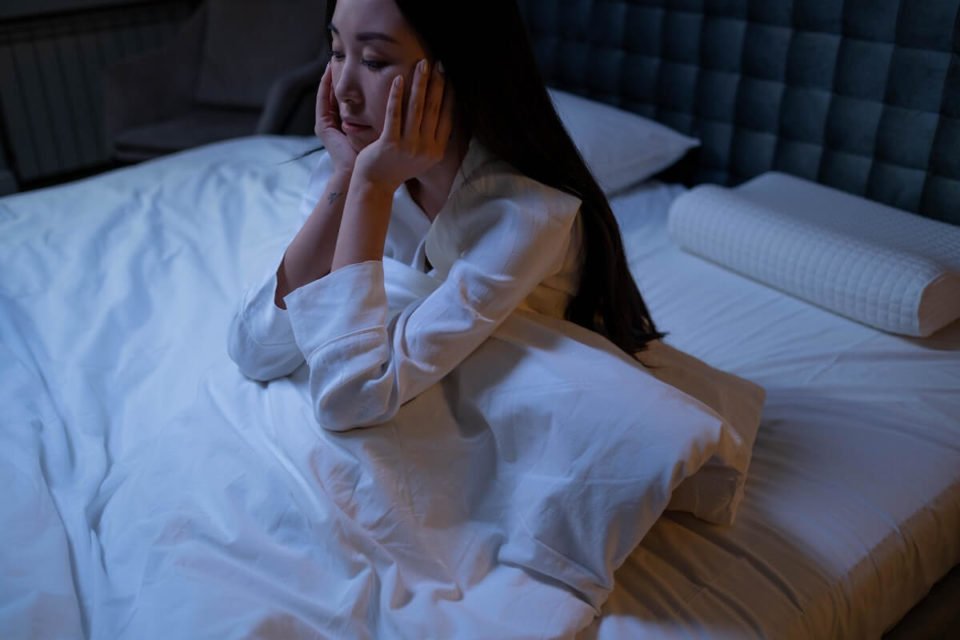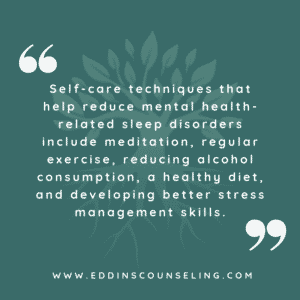October 7, 2019
Sleep Disorders, What Causes Them, and How to Mitigate Them
Written by Rachel Eddins
Posted in Emotional & Mental Health and with tags: Anxiety, insomnia, sleep

Sleep disorders — a blanket term referring to conditions that prevent people from sleeping well on a regular basis — are common. In fact, by some estimates, as many as three-quarters of adults suffer from some type of sleep disorder. Sleep disorders can have a significant effect on our general health and well-being.

Issues with sleep are typically a symptom of another problem. They can be brought on by physical ailments (such as pain from arthritis or fibromyalgia) or a medical issue like sleep apnea. It can also be caused by anxiety or depression, or environmental factors such as too much light in the room. What makes something a sleep disorder is that it is ongoing for more than a few nights. Doctors will typically diagnose a sleep disorder if you have trouble sleeping more than three nights a week for a month. Most people with sleep problems have signs of sleep deprivation, including trouble regulating their emotions, difficulty concentrating, slow reaction times, and excessive sleepiness.
Solving sleep problems starts with identifying your specific issues.
Common Sleep Disorders
Many people tend to categorize sleep disorders under the general umbrella of insomnia. Insomnia is the clinical term for the inability to fall asleep or stay asleep during the night, but insomnia itself isn’t necessarily a sleep disorder in and of itself, but rather a symptom of a bigger problem. For instance, people with anxiety often suffer from insomnia. While not being able to sleep only exacerbates anxiety, creating a vicious cycle.
Anxiety and depression are among the most common sleep disorders. Others include:
- Sleep apnea, or pauses in your breathing during the night that cause you to wake up
- Restless leg syndrome, a condition that causes an urge to move your arms and legs during the night
- Narcolepsy, a brain dysfunction that causes excessive daytime sleepiness and “sleep attacks” throughout the day
- Parasomnias, or abnormal activities while sleeping, including sleepwalking, teeth grinding, and sleep talking
Any of these issues, in addition to chronic diseases like asthma, can cause sleep disorders. In many cases, they can either cause or increase anxiety as well. Because of the significant effects that sleep deprivation can have on your overall health, it’s important to address sleep disorders and make changes that will support a better night’s sleep.
Mitigating the Effects of Sleep Disorders
The first step in addressing a sleep disorder is to address any environmental factors that could be disrupting your sleep. The solution may be as simple as improving your sleep hygiene. Creating a cool, dark, quiet, and comfortable environment for sleep, reserving your bed for sleep and sex only (not working, paying bills, etc.). Turning off devices at least an hour before bedtime can go a long way toward supporting a better night’s sleep.

If changing your sleep environment doesn’t improve your sleep, schedule an appointment with your healthcare provider to rule out any medical or physical causes for your sleep disorder. This could include a sleep study using polysomnography to measure your movements and activity during sleep. Or an electroencephalogram to measure brain activity, and blood tests to test for narcolepsy or other underlying medical conditions. Should these tests indicate a medical issue, your provider will develop a treatment plan that may include medication or the use of a CPAP machine.
For sleep disorders caused by mental health issues, your healthcare provider will likely recommend a multi-pronged treatment approach involving self-care, cognitive behavioral therapy, and in some cases, medication for anxiety and to help you sleep. For example, a self-care plan may include using weighted blankets for anxiety; sleeping under a blanket equal to 10 percent of your body weight has been proven to help reduce cortisol production and increase “feel-good” hormones like dopamine, reducing anxiety and improving sleep.
Other self-care techniques that help reduce mental health-related sleep disorders include meditation, regular exercise, reducing alcohol consumption, a healthy diet, and developing better stress management skills. Altogether, when combined with cognitive-behavioral therapy designed to treat anxiety, these changes can make a significant difference in overall sleep quality and reduce the likelihood of an ongoing sleep disorder.
Seek Help From a Licensed Therapist
Sleep disorders aren’t something to ignore or simply accept as a part of life. The effect a lack of sleep can have on your well-being means that sleep should be a top priority. If you are struggling to fall or stay asleep more often than not, you need help. Whether it’s changes to your sleep environment and habits or more aggressive interventions, effective treatment will ultimately mean a healthier, happier, you.
Reaching out to a licensed, experienced therapist can be the first step in treating your sleep disorder. Eddins Counseling Group in Houston, TX has many therapists the specialize in treating insomnia or other sleeping related concerns. Or consider our Cognitive Behavioral Therapy for Insomnia Group, which has shown to be the most effective way to treat insomnia without medication. Call us today at 832-559-2622 or book an appointment online.
Grounding & Self Soothing
Get instant access to your free ebook.
Why You Feel This Way
Get instant access to your free ebook.






















